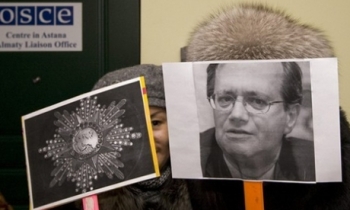The escalating number of violent attacks on certain parts of the Nepali media can no longer be regarded as hooliganism. Instead, they point to an organised assault on freedom of expression in Nepal, free speech group ARTICLE 19 has asserted.
On the morning of October 24, the CEO of leading media house Himalmedia was attacked on his way to work. Just a few weeks later, bundles of Himalmedia's newly printed Himal Khabar Patrika were doused in petrol and burned. On November 16, twenty-five men circled the depot whilst eight ransacked the building, cutting off phone lines and stealing mobile phones before threatening to kill the distribution staff. The edition carried as lead story an exposé on the growing violence carried out by youth groups associated with political parties.
Himal Khabar Patrika's editor Kanak Mani Dixit told ARTICLE 19, "There is a planned effort under way to weaken the resolve of journalists amidst a growing political polarisation in Nepal today. Besides verbal intimidation, there have been physical attacks. Our own media house has been victim to planned attacks in the last couple of weeks; first an attack on the vehicle carrying our CEO, and lately an act of arson and the torching of our latest issue at our Kathmandu distribution centre."
A number of similarly unconcealed attacks on the media have continued to occur over the last few weeks and have been reported by ARTICLE 19 partners in Nepal. Staff and buildings of the Regional Bureau office of Avenues Television were attacked on November 18, while similar assaults took place against Nuwakot Jagatan on November 17 and the government-controlled Rastriya Samachar Samiti (RSS) on November 13.
In October there were also attacks on a Gorkhapatra correspondent on October 28, Basudha Editor Rammani Upadhyay on October 24, the offices of Tarai Times on October 20 and a Himalayan Times correspondent on October 11. According to local staff, media personnel continue to be phoned and given death threats.
Escalating harassment against media staff in a coordinated manner by what appears to be organised groups demonstrates both an increase in impunity in Nepal and a decrease in political interest in protecting Nepal's vibrant media. It may also point to support for such attacks from higher-up in the government.
As Kanak Mani Dixit continued, "It is important that a culture of self-censorship does not develop to weaken the role of media in a developing democracy. We have fought hard for media freedom in Nepal over the years, and it would be a shame to let it come under a cloud at a time when media should be a partner for critiquing those in power, bringing transparency in political relationships, and helping create a healthy environment for the drafting of a new constitution."
The timing of these attacks on the media coincide with the government's systematic blocking of legal reforms, called for by local and international organisations, including ARTICLE 19. The government has consistently ignored orders given by the Supreme Court of Nepal to reform both the Printing and Publications Act and the Offences Against the State and Punishment Act, which were found to be in contravention of the Interim Constitution 2006.
ARTICLE 19 is calling upon the Nepal government to implement the changes in legislation required by the very constitution that they drafted in 2006. ARTICLE 19 is also urging the government to create an environment whereby the media can carry out its work free from interference or violence.
It seems likely that these attacks are not simply random criminal acts but form part of a sustained and deliberate assault on freedom of expression, says ARTICLE 19. The impunity of those involved and the lack of any legislative changes ordered by the Supreme Court not only generate a "chilling effect" within the local media, but also amongst the NGO community and civil society itself.









